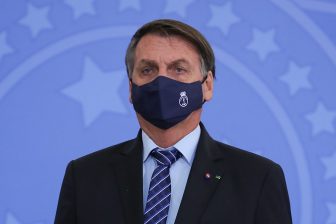SÃO PAULO — 5,500 miles south of Minneapolis and one week prior to the killing of George Floyd, 14-year-old João Pedro Matos ventured to his cousin’s house to play pool. The Black adolescent arrived just as Rio de Janeiro police began a raid on alleged drug traffickers nearby. His parents would find his body 17 hours later.
Witnesses say police stormed the house firing, and official forensic reports counted 72 bullet holes across the walls, furniture and ceiling. João Pedro suffered a lethal shot to the back, the victim of what the police allege was a shootout with gang members who had fled through the house in Rio’s Complexo do Salgueiro favela. Nearly a year later, the investigation into the death of João Pedro has stalled, and the officers under investigation for his death continue to participate in police raids.
“Justice is so hard to achieve here in Brazil,” Rafaela Matos, João Pedro’s mother, told AQ. “I see the George Floyd case and I feel even more anguish. I ask myself, why was that case resolved and not this one?”
As global activists and policymakers celebrate the conviction of Floyd’s murderer, police officer Derek Chauvin, Brazil — where police kill about 6,000 people per year, some 80% of them Black and Brown — is yet to begin its own reckoning with police violence. Though Chauvin’s conviction represents an initial, if promising, step towards meaningful reform in the U.S., Brazilians anticipate a long road ahead in combating the country’s astronomical levels of police violence and impunity.
“Brazil is light years away from where the U.S. is today in terms of police reform, despite Brazil’s strong social mobilization in protests and Black activism,” said Thiago Amparo, a professor of international law and human rights at the Getúlio Vargas Foundation in São Paulo. At the heart of the issue, said Amparo, lies an ingrained impunity that has made it nearly impossible to hold police accountable for abuse.
Matos has been forced to confront that lack of accountability first-hand.
“I never imagined that the justice system in Brazil had this level of impunity,” she said, adding that she has joined a group of mothers who have lost family members to police violence, most of them pursuing investigations and trials that have stretched over years if not decades. “You get the feeling that the police are dragging out the process to avoid punishment, to avoid justice.”
Indeed, as in the U.S., most cases of police violence do not make it to trial. A 2015 parliamentary commission on police killings in Rio de Janeiro concluded that public prosecutors at the state public ministry – the body charged with oversight of the police – had archived 98% of cases of police killings between 2010 and 2015. A report by Amnesty International the same year analyzed 220 investigations into police killings into Rio de Janeiro in 2011 and found that 183 were still open four years later.
“Not much has changed since then,” said Daniel Hirata, a researcher and professor of sociology at the Federal Fluminense University. “Police forces in Brazil basically function as autonomous organizations.”
The issue is far from exclusive to Rio de Janeiro. An unreleased 2020 study from the Forum on Brazilian Public Security, a non-governmental think tank, concluded that public prosecutors in the states of Rio de Janeiro, Minas Gerais and São Paulo rarely denounced police in cases of alleged undue force.
“There are no effective internal or external control mechanisms that monitor, evaluate and punish police,” said Amparo. “What we have is a rampant and armed entity that confuses violence for policing.”
Unchecked, such violence has soared over the last decade.
What progress that has been made has been born of concerted civil society efforts. Pressure from academic groups, favela activists and think tanks even led Supreme Court Justice Edson Fachin to issue – in the wake of the killings of Floyd and João Pedro – a decision banning all but the most exceptional police raids in the favelas for the duration of the pandemic.
For a time, it worked. With the raids suspended, police killings plummeted.
“When it was respected,” said Hirata, “we saw police killings drop by 70%. This shows you just how much room there is for advancement in this area.” Hirata and his team at the Federal Fluminense University calculated that the ban saved at least 288 lives from police violence in 2020.
But Brazilians would soon learn that the Supreme Court decision was no substitute for concrete policy. In October, police raids returned with a vengeance, as newly-appointed Rio civil police chief Allan Turnowski declared that, if such raids could only be conducted in exceptional circumstances, then Rio should constitute a perpetual state of exception.
Police violence has since continued unabated. Mere days after a landmark Supreme Court hearing on police violence, Rio police descended in joint raids on the favelas of Maré and Alemão, leaving three dead and a trail of property destruction in their wake.
For Marcelle Decothé, a coordinator at the Marielle Franco Institute, true progress will require Brazil to confront deeper issues of centuries-old structural racism and the normalization of violence in the favelas.
“Police violence here gets normalized in such a way that, the deaths of countless George Floyds here get no mention in local and national news,” said Decothé, who co-organized last June’s protests in Rio with the Favelas na Luta (Favelas in the Struggle) group.
“Each day, we are losing generations of youth that could be building new futures, new opportunities for change and transformation.”
Matos, all too aware of that loss, isn’t giving up on her quest for justice. “João Pedro was not the first and he will not be the last, unfortunately,” she said. “No mother should expect to lose her son like this, and that is why we are seeking justice, so that this impunity ends.”
—
Ruge is a freelance journalist






